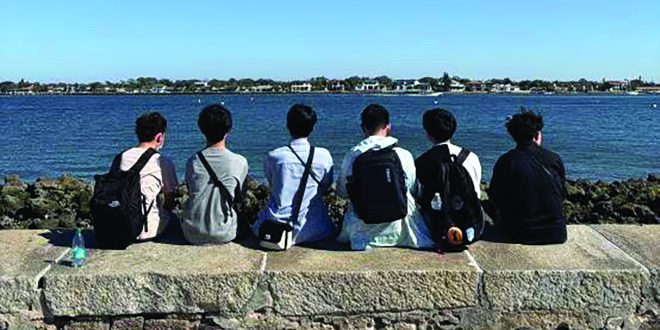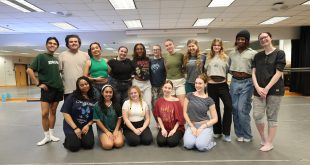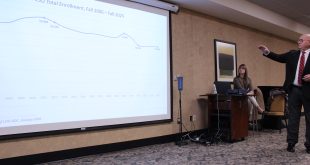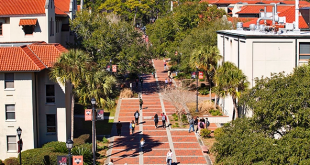Story By: Bailey Wilson, Ansley DeCenzo, Arizona Renfroe, Lloy Hudson, Winter Dube, Armoné Gates, James Brown, Jasmine Hightower, SeanTae-A Price
In a small blue house next to the Student Health Center, a student walks through the yellow front door of the ELI Annex. She stops just long enough to sign her name on the sheet on the table in front of her before walking to the back of the house.
Several tables are set up in a back room, filled with standard American board and card games: Scrabble, Headbandz and Taboo join various other games line shelves in the hallway outside. She joins several other students in her program, many of which are from her home country of Japan and sits at a table of four students. One of them is an American student, who starts a game of Uno at the table with the others.
This is part of the conversation classes VSU hosts for international students hoping to learn English. Simple games like these create a space for these students to not only come out of their shells, but to understand the language daily and engage with students outside of their own countries. 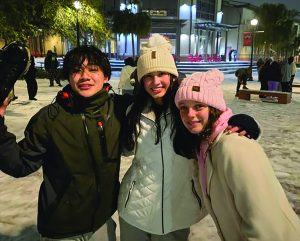
Welcome to Valdosta!
Chinatsu Mukoyama, an 18-year-old freshman from Tokyo, Japan, began her journey at VSU on Jan. 28 and plans to stay for four years to study English with a focus on grammar.
Mukoyama lives in Reade Hall amongst her other international friends. Having practiced English since junior high, she is eager to engage herself in American culture while improving her language skills.
“I wanted to try a new town and make new friends so I can speak English well,” Mukoyama said.
While excited about the opportunity to communicate in English, she admits missing home comforts.
“I am going to miss Ramen and my mother’s food in Japan,” Mukoyama said.
Mukoyama has also observed the lively nature of American culture.
“So many people want to have fun here in America,” Mukoyama said.
In contrast to Chinatsu’s temporary stay, Maria Gairedo, an 18-year-old freshman from Venezuela, is settling down in the United States. Maria arrived with her parents and is obtaining her green card, planning to stay for the time she needs to acquire it.
“I’ve only practiced English for four months. The pronunciation is hard,” Gairedo said.
Despite her lack of experience, Gairedo is determined to overcome the challenges of English pronunciation.
Maria’s diverse interests include modeling, which she’s been doing for four years and she enjoys spending time with friends. While excited about her new life, she reflects on what she’ll miss.
“I’m going to miss my grandma, family, and the beach,” and “I’m going to miss the food, parties, and traditions back at home,” Gairedo said.
Maria’s journey represents a significant life change, as she transitions from her hometown to life in the United States, where she plans to work at Walmart while pursuing her studies. 
Since the beginning of the semester, over 25 students from Japan, China, Korea, Ecuador, Mexico and other countries have arrived at VSU to study abroad. Students arrived through the Center for International Programs (CIP) and English Language Institute (ELI).
Masaya Murakami is a 20-year-old student from Tokyo International University in Japan studying communications until the end of December through the ISEP exchange program, a cheaper alternative study abroad program that allows students to go internationally and pay their tuition and fees to their home institution.
Murakami arrived at VSU on Jan. 8. During his first few weeks, he described his time in America as “a reality TV show,” and was amused with how much went on every day. According to him, classes in Japan are taken way more seriously than in America.
“We cannot eat snacks, listen to music, or talk in class. It is more relaxing here,” Murakami said.
So far, he has been able to make many friends. While on-campus, he has been able to build campfires; watch basketball games; and play football, volleyball and tabletop games.
“If you have friends, there is always something to do,” Murakami adds.
Unlike other students who typically travel home for summer while going abroad, he will be staying and enjoying his time in America until December.
“I will miss my family, friends, and food, but I am excited to make more friends and learn better English.”
Ryunosuke Arai, a 19-year-old student from Obirin University in Tokyo, Japan, is studying through ELI until May. He says he is a bit shy about talking to native English speakers.
“I was surprised about the culture of small talk. It happens anywhere such as in the dorm, on the road, and at the register, even if we don’t know about each other,” Arai said.
Japanese students are often afraid of talking to people they meet for the first time. Americans talk to them like casual conversation with friends. For many Japanese students who study here, this is a huge cultural shock. Not only are Americans friendly no matter the place, but they are also very welcoming and inviting. For example, the ELI students were brought to St. Augustine this past weekend.
“I felt nervous and excited,” Arai said. “No one helped me because it is outside of the university. In the restaurant, my friends and I paid tips for the first time and discussed how much to pay. I ate a hamburger combo. It tasted good! And the staff was so friendly.”
“It was very fun,” Gahyeon Lee, a 21-year-old student from Dongguk University in South Korea said. 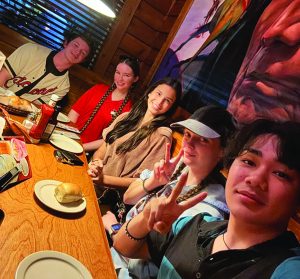
William Yang, an engineering major, is among the students here to learn English. His hobbies include listening to music, table tennis and cooking and he hopes to enjoy American food during his visit. He will miss his grandmother the most while being away from home.
Daiki is here studying Japanese as well as language. He is only here for four months, but in that time, he hopes to make more friends and learn to speak English better. He likes learning to speak English because it gives him a challenge. Daiki enjoys reading on his Kindle, fast cars and sword fighting. Some more things he enjoys include motorsports, video games and music.
Although Daiki is here in the U.S. having a good time, he expressed how he misses his parents and that he did not have siblings; making him an only child.
A space to learn
The Conversation Starters is an organization here on campus that helps international students with learning how to speak English. This event takes place on Mondays from 4 p.m. to 6 p.m. and Fridays from 2 p.m. to 3:30 p.m. located at the ELI annex beside the Health Center.
Within these events the exchange students are teamed up with conversation English partners who help them further grow and develop their English-speaking skills. At each session games are provided as a fun and exciting way to learn English verses doing busy work.
Connections and friendships can be made at this event. As it strives for all students to learn about the different cultures and customs within the world around us. This event not only benefits the exchange students but also the English conversation partners. Many students so far have had nothing but positive feedback about the organization and how it has benefited them within their college journey.
“I heard about [conversation class] via a friend who graduated last semester, and I am part of BCM membership, and my task was to involve the international students in some way onto the BCM,” said junior sociology major Jeny Martinez. “I went with him and another student, and it was very fun, we just basically kind of go with a list of questions and each question is different from each session. The first session I went to it was like dating questions.”
Martinez also mentioned how she appreciated learning about different cultures and interacting with the people within them.
“It’s fun to learn about different cultures from people directly from that culture,” Martinez said.
Within the conversation class, international exchange students also get to explore their passions and find what they look forward to career-wise once they are fluent in English.
“I came here to learn English; I want to be a study abroad agent. I want to help people who want to study abroad, and I want to go around the world,” said 19-year-old Japanese exchange student Choharu Nakamura. 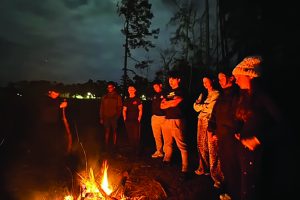
Although the students come from many different backgrounds, the program’s focus on unity provides them with all of the tools and resources necessary to make meaningful connections with others.
The event is hosted by helpful staff who are always willing to lend a helping hand if needed. Whether international or local, if students feel stressed or uncomfortable about speaking to someone new, there is always someone around to assist.
“If you want to make an impact on someone’s life who may be afraid to come out of their shell… you are the key to unlocking their shell,” said staff member Ahava Judah.
The event has been shown to help not only the students who are learning English, but the staff as well.
“It’s been a really good experience. It’s made me more aware of how I speak, how I enunciate, and how I punctuate my speech… As well as understanding the struggles that non-English speakers have,” said staff member Cheryl Rehberg.
A word from our sponsors
The International Student Program at VSU is essential to helping students from all over the world. The program was started in response to the increasing demand for international education and was designed to address the difficulties faced by international students, including adjusting to a new academic setting and navigating the visa and immigration procedures. VSU realized that to support these students’ success and community integration, a customized curriculum was required.
The program provides a range of services, such as academic help, job assistance, cultural integration events and visa and immigration counseling. Leading these initiatives is the Center for International Programs (CIP), which offers pre-arrival advice on housing, visa paperwork and admissions. International students have access to health assistance, academic tutoring and orientation activities once they arrive on campus.
To promote community among students from various backgrounds, the program also hosts social events through the International Student Association (ISA) and cultural events like International Night, where students demonstrate their cultures. 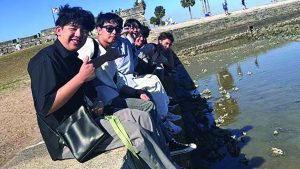
Dr. David Starling, Global Initiatives Director for VSU, shared that international students often start with lower English proficiency.
“These students are here to learn English,” Starling said. “They don’t have the scores that would get them into a university at this point.”
He explained that the program helps them develop language skills, noting that students at lower levels need more time to prepare.
Judah explained that the classes aim to boost students’ confidence in English.
“One is to organize and make sure everyone is staying active, engaging in conversations, coming up with different programs to make sure they’re being challenged in their learning,” she said.
By expanding further, VSU’s International Student Program enhances the university’s dedication to international education and cross-cultural interaction while bringing a variety of viewpoints and experiences to the campus.
All VSU students are welcome to participate in the conversation event and are encouraged to make meaningful and lasting friendships with the international participants.
If students are having trouble locating the blue house to participate, they are encouraged to navigate to the Center of International Programs located at 204 Georgia Avenue Valdosta, Georgia 31698-0037.
Photos by Masaya Murakami
 The Spectator The independent student newspaper of Valdosta State University
The Spectator The independent student newspaper of Valdosta State University

